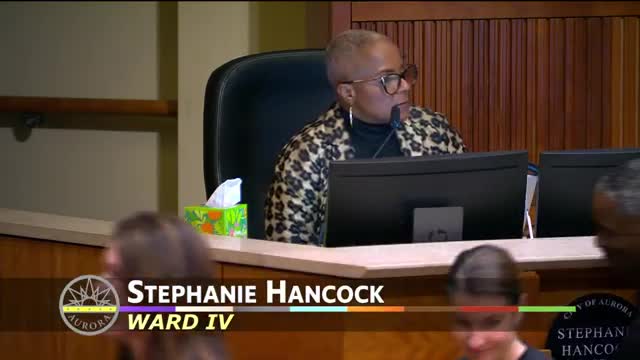Council revises public-comment rules: 30 minutes morning/30 minutes end, resident priority and day-of online sign-up
Get AI-powered insights, summaries, and transcripts
Subscribe
Summary
Aurora City Council adopted changes to rules of procedure for "public invited to be heard," prioritizing Aurora residents, establishing two 30-minute comment blocks, shortening speaker time and permitting day-of online sign-up; measure passed after extensive debate and public testimony.
The Aurora City Council voted to amend its rules of order for "public invited to be heard," moving to a format that provides 30 minutes at the start of meetings and 30 minutes after council reports, prioritizes Aurora residents, shortens individual speaking time to two minutes, and allows a day-of online sign-up window.
Councilmember Allison Hancock sponsored the change and the motion was seconded by Councilmember Jernske. Councilmember Bergen offered a compromise amendment — accepted as friendly — that provided 30 minutes at the start and 30 minutes at the end of meetings and set a two-minute time limit per speaker. Councilmember Murillo successfully pushed an amendment to allow online sign-ups by 1 p.m. on the day of the meeting while retaining in-person sign-up between 5 p.m. and 6:20 p.m. The clerk said staff can verify resident status using methods already in city code.
The final amended resolution also directs the city manager to close the Aurora Municipal Center to the public if a meeting’s disruption jeopardizes the council’s ability to conduct business; council accepted language removing a fixed 10-minute vacate period and instead directed the manager to close the facility to the public as appropriate.
Supporters of the change, including Councilmember Hancock, said repeated disruptions had interfered with the council’s ability to complete business and that the revised rules balance rights to speak with the council’s need to run lengthy agendas. Opponents, including Councilmember Murillo and others, described the change as a rollback of public access and said verification of residency and shortened speaking time could be burdensome.
Public testimony included speakers who supported decorum and changes (for example, Tanya Tabachick said she supported measures to ensure respectful public input) and speakers who opposed restrictions, arguing the amendments would limit residents’ access. Several speakers tied the debate to broader frustrations with the council and public safety issues.
Key details of the adopted changes: residents will be given priority in the speaker order if they choose to verify residency with an ID, utility bill or other proof; two-minute speaker limit per person; 30 minutes at start and 30 minutes at end of meetings reserved for public comment (resident priority at the start period); day-of online sign-up allowed through 1 p.m., plus in-person sign-up window from 5:00 p.m. to 6:20 p.m.; city manager authorized to close public access to the municipal center if disruption prevents council business (no fixed 10-minute vacate language was retained).
Outcome and next steps: The motion as amended passed 7-2. City staff (clerk’s office) will implement the updated procedures and adjust sign-up and verification processes; councilmembers asked staff to provide operational details to ensure feasible verification and orderly speaker lists.
Why it matters: The rule changes alter how and when residents can address elected officials; proponents argued the changes will reduce disruptions and preserve meeting efficiency, while critics said the revisions add administrative hurdles and reduce transparent public access.
